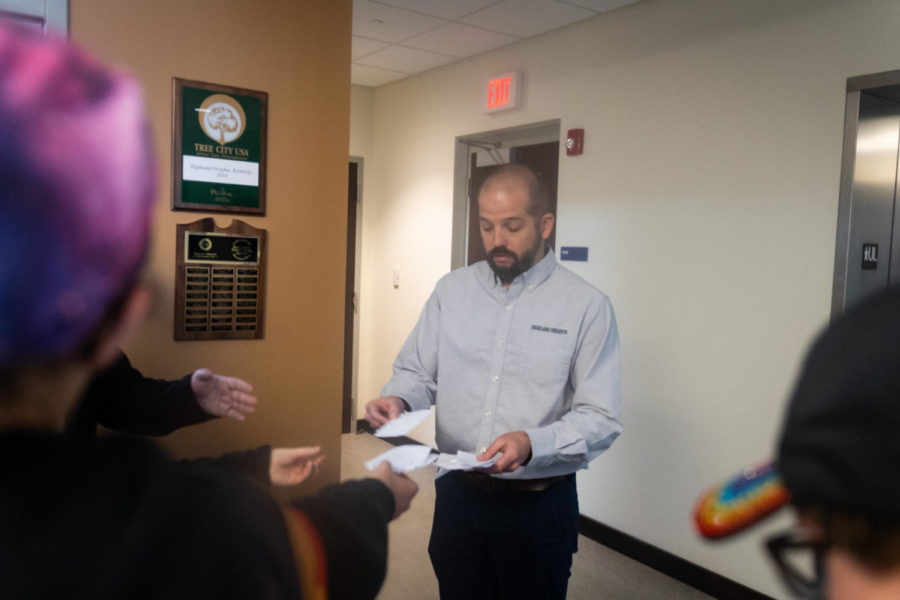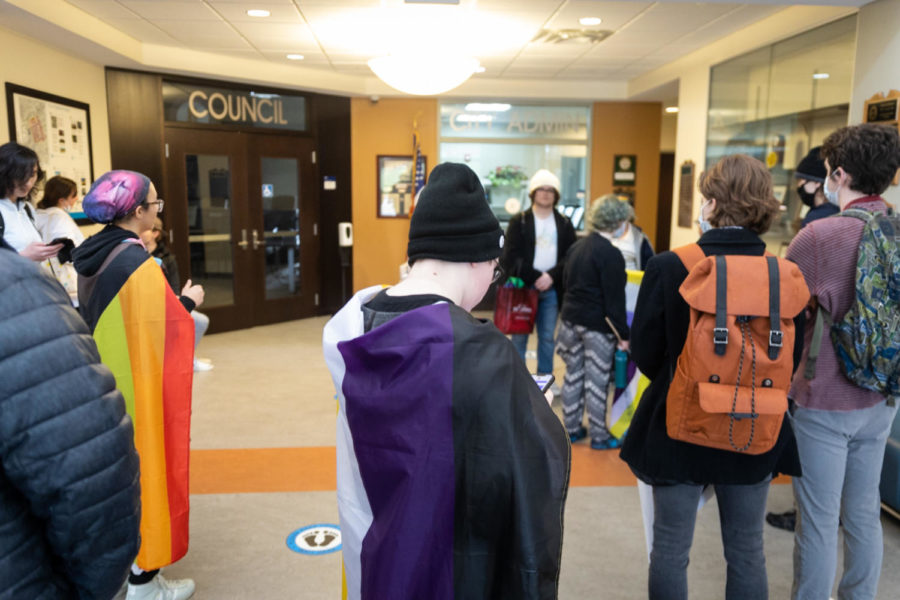LGBTQA+ students gathered in front of the Highland Heights City Council office after marching from the Student Union.
NKU students march to city hall in protest of anti-trans bill
April 2, 2023
LGBTQA+ students braved the rainy weather on a march from the Student Union to the Highland Heights city administrative building Friday afternoon to protest the passage of Kentucky Senate Bill 150.
Gathering in front of the city council offices, the students delivered letters to a city administrator, seeking to pass their word along to the state legislature that has just banned gender-affirming care for transgender youths.
Introduced in February of this year, SB 150 originally allows parents to opt their children out of school courses, curriculums and programs on human sexuality, and it prohibits school personnel from discussing topics of human sexuality with students. The bill also allows school personnel and other students to use pronouns associated with a student’s biological sex, even when the student does not identify with those pronouns.
The bill was then considerably amended and passed with overwhelming majority in both chambers of the state legislature on March 16. In its final version, SB 150 prohibits the teaching of gender identity, gender expression and sexual orientation in schools, and prevents students from using restrooms, shower rooms and locker rooms reserved for a different biological sex. The bill additionally bans a range of gender-affirming care procedures for people under 18 years of age, including puberty blockers, hormone therapy and surgeries. The original provisions still stand.
“This is going to hurt so many people, so many kids,” said Maddie Chapman, a student participating in the march. “As someone who is disabled and trans, I’ve had a hard time with my life. The only thing that made me survive was supporting parents and supporting teachers. Some people don’t have that whatsoever, and having these bills passed and not having the rights that they need is going to kill them.”
Kentucky Governor Andy Beshear vetoed the bill on March 24. Five days later, his veto was overridden by both the senate and house. In a statement following the veto override, Executive Director Amber Duke of the American Civil Liberties Union of Kentucky (ACLU-KY) said that the provisions on health care ban will not go into effect until late June and that the organization will challenge the legislation in court.
For the NKU students at the march, the bill’s passage is an augur of future harm to LGBTQA+ individuals.
“I am more than horrified by this bill,” said Rin June, one of the students at the march. “It is not only a deprivation of civil liberties but also harmful toward the economics and the wellbeing of people in the future. It is a dangerous law. It will ultimately isolate people, allow people to be targeted both by hate groups and politically, by the police.”
LGBTQA+ youths in Kentucky public schools experience higher rates of bullying, harassment and assault, and trans youths in particular see higher rates of depression and suicide, according to Dr. Bonnie Meyer, former director of the LGBTQ+ Programs and Services at NKU and current co-chair of the Northern Kentucky Pride Center.
“And yet, we still see schools as the place where all of our youths should feel they belong. They should feel valued, they should feel welcomed, they should feel as if they can bring who they are and their families into these spaces,” Meyer said. “You cannot learn, you can’t throw yourself into your academic studies when you’re being told that it’s not okay to be who you are.”
James Renton, an education major and student organizer, expressed concern about having to out future students who confide that they are gay or trans, referring to a provision in SB 150 that requires schools to disclose all student information with their parents.
“That would put them in danger not only at home, but also their parents would send them away to conversion therapy,” Renton said, noting that while the city of Highland Heights is a relatively safe place for LGBTQA+ individuals, no bills banning conversion therapy have been passed. “But if we have the city fighting against conversion therapy, we can at least lessen the effect of this law on trans kids while we work on overturning this law that has been passed in the state legislature.”
Ash Landis, a student at the march, criticized the banning of gender-affirming care treatments that might double as essential medical procedures for conditions like polycystic ovary syndrome (PCOS) and breast cancer, not just for trans people but for everybody.
“Since Roe v. Wade was overturned, the bills have been getting progressively worse,” Landis said. “They’re putting more and more restrictions on our bodies when they have nothing to do with us. They don’t know what it’s like to get pregnant by rape, they don’t know what it’s like to have breast cancer, they don’t know what it’s like to have PCOS to the point where you can’t stand. They will remove those stuff because it’s considered gender-affirming care.”

With the passage of the anti-trans bill, Renton fears for the possibility of state legislatures outlawing same-sex marriage and interracial marriage, which are currently protected by federal law. Though state laws hold power over local laws, Renton advocates for change through action and through the ballot.
“We can protest, we can petition, but politicians aren’t going to listen to us unless we have money,” Renton said. “We need to get their voices out there, we need to vote, we need to vote out the politicians that are letting these laws go into effect and we need to vote for politicians that are willing to stand up for basic human rights. That is how we’re going to effect change.”
Bonnie Meyer calls for allies from all facets of community—organizations, businesses, faith leaders, community leaders, educators—to lend support for LGBTQA+ Kentuckians. As for the students, they are not going to stand idly by.

